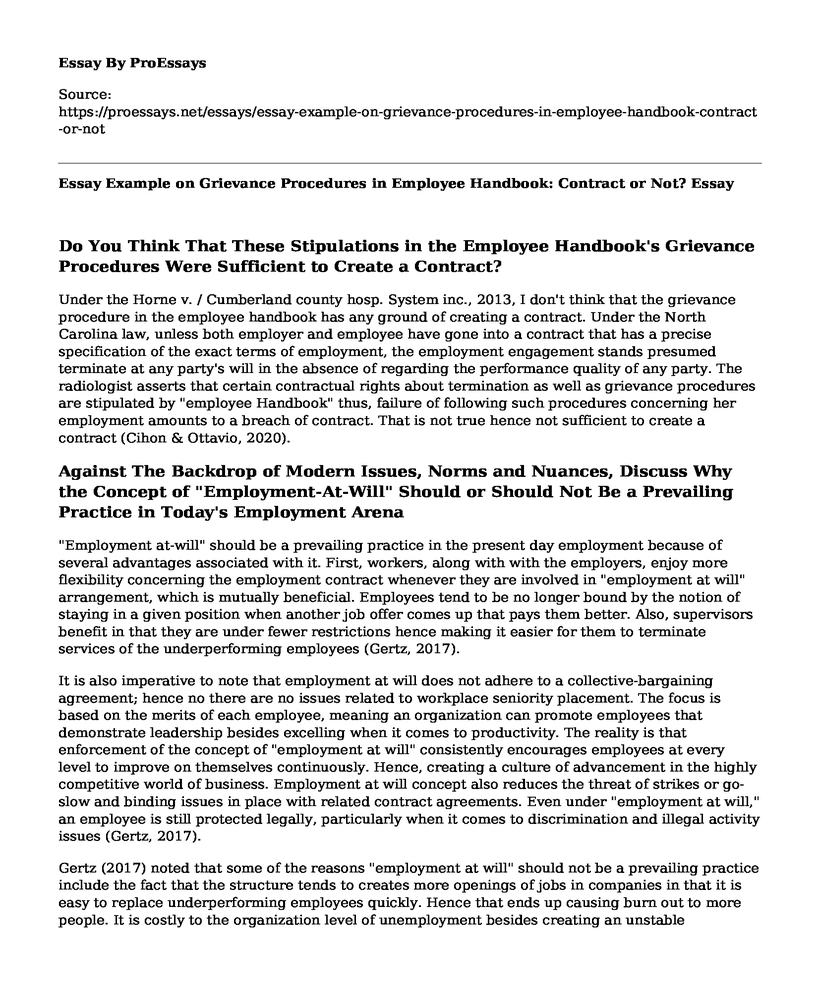Do You Think That These Stipulations in the Employee Handbook's Grievance Procedures Were Sufficient to Create a Contract?
Under the Horne v. / Cumberland county hosp. System inc., 2013, I don't think that the grievance procedure in the employee handbook has any ground of creating a contract. Under the North Carolina law, unless both employer and employee have gone into a contract that has a precise specification of the exact terms of employment, the employment engagement stands presumed terminate at any party's will in the absence of regarding the performance quality of any party. The radiologist asserts that certain contractual rights about termination as well as grievance procedures are stipulated by "employee Handbook" thus, failure of following such procedures concerning her employment amounts to a breach of contract. That is not true hence not sufficient to create a contract (Cihon & Ottavio, 2020).
Against The Backdrop of Modern Issues, Norms and Nuances, Discuss Why the Concept of "Employment-At-Will" Should or Should Not Be a Prevailing Practice in Today's Employment Arena
"Employment at-will" should be a prevailing practice in the present day employment because of several advantages associated with it. First, workers, along with with the employers, enjoy more flexibility concerning the employment contract whenever they are involved in "employment at will" arrangement, which is mutually beneficial. Employees tend to be no longer bound by the notion of staying in a given position when another job offer comes up that pays them better. Also, supervisors benefit in that they are under fewer restrictions hence making it easier for them to terminate services of the underperforming employees (Gertz, 2017).
It is also imperative to note that employment at will does not adhere to a collective-bargaining agreement; hence no there are no issues related to workplace seniority placement. The focus is based on the merits of each employee, meaning an organization can promote employees that demonstrate leadership besides excelling when it comes to productivity. The reality is that enforcement of the concept of "employment at will" consistently encourages employees at every level to improve on themselves continuously. Hence, creating a culture of advancement in the highly competitive world of business. Employment at will concept also reduces the threat of strikes or go-slow and binding issues in place with related contract agreements. Even under "employment at will," an employee is still protected legally, particularly when it comes to discrimination and illegal activity issues (Gertz, 2017).
Gertz (2017) noted that some of the reasons "employment at will" should not be a prevailing practice include the fact that the structure tends to creates more openings of jobs in companies in that it is easy to replace underperforming employees quickly. Hence that ends up causing burn out to more people. It is costly to the organization level of unemployment besides creating an unstable workforce.
Discuss The Hodge V. Evans Case And, Specifically, Why The Court's Holding Either Does Or Does Not Seem To You To Be Good Law
A motion regarding the judgment only needs to be granted if the pleadings, dispositions, interrogatories answers along with the file's admission and affidavits demonstrate no genuine issue concerning any material fact upon which the moving party remains entitled as a matter of fact to judgment. Notwithstanding the fact, little discovery took place. The district court gave a conclusion that no genuine issue concerning the contract duration in that Hodge agreed that contract meant not to last forever, nor had a fixed term. According to the view of the district court, the contract remained indefinite as well as terminable at will. Hence it does not matter if Hodge was terminate in the absence of cause (Gertz, 2017).
The bottom line is that because of that, the court's holding is not a good law to me, considering that the principle of the contract remains the concept of freedom of contract. Thus, meaning contracting parties have the right to structuring their transaction according to their wishes.
References
Cihon, P. j., & Ottavio, J. (2020). Employment and labor law, 10th Edition. Cengage.
Gertz, S. C. (2017). At-will employment: Origins, applications, exceptions, and expansions in public service. In American Public Service (pp. 47-74). Routledge.
Hodge v. Evans Financial Corp., No. 81-2726, slip op. at 6 (D.D.C. 15 April 1982)
Cite this page
Essay Example on Grievance Procedures in Employee Handbook: Contract or Not?. (2023, Mar 28). Retrieved from https://proessays.net/essays/essay-example-on-grievance-procedures-in-employee-handbook-contract-or-not
If you are the original author of this essay and no longer wish to have it published on the ProEssays website, please click below to request its removal:
- Sources of Innovative Opportunities Essay
- Essentials of Business Law Paper Example
- Research Paper on Employability and Career Planning
- Business Communication in Different Cultures Essay Example
- Essay on the Benefits of International Business: Understanding & Shaping Your Career
- Capitation Model: A Solution to Healthcare Finances Misuse - Essay Sample
- Report Example on Trianon Ventures into Hungary Business Market, Fails, Then Succeeds







